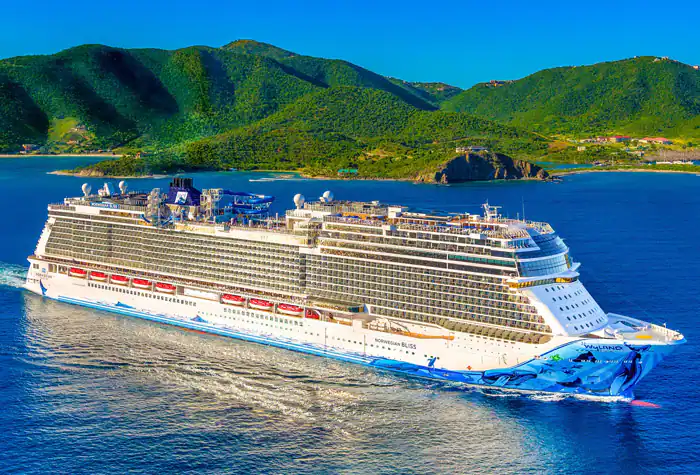Meksika Kruvaziyer Vergisini Ayarladı
Meksika yakın zamanda yaptığı bir hamleyle kruvaziyer vergisini US$5 (yaklaşık 90 R) 1 Temmuz'dan itibaren kişi başına. Bu ayarlama, çok daha yüksek bir oran olan ilk teklifle ilgili önemli tartışmaların ardından geldi. $42 (yaklaşık 770 R). Yeni vergi oranı, ülkeye yolcu gemisiyle giriş yapan tüm bireyler için geçerli olacaktır.
Bu yeni hükmün, Avrupa Birliği'nin $5 oranını bu yılın geri kalanı için düşürmüştür. Bununla birlikte, bu oranın $10 (R185) tarafından 2026 ve $21 (R385) içinde 2027Travel Pulse tarafından bildirildiği üzere.
Vergiyi Çevreleyen Tartışmalar
Resmi olarak bilinen adıyla yerleşik olmayan vergiBu verginin uygulanmasına bu yılın Ocak ayında başlanması öngörülüyordu. Ancak, başta kruvaziyer şirketleri ve Meksika limanlarındaki kruvaziyer gemi trafiğine bağımlı topluluklar olmak üzere çeşitli paydaşların önemli tepkileriyle karşılaştı. Daha önce, Aralık 2024'te yayınlanan raporlarda, verginin başlangıçta önerildiği gibi uygulanması halinde kruvaziyer şirketlerinin Meksika'yı bypass etmek üzere güzergahlarını yeniden gözden geçirebilecekleri belirtilmişti.
Kruvaziyer Turizmi Üzerindeki Potansiyel Etki
Kruvaziyer turizmi seyahat alanında en hızlı büyüyen sektörlerden biri olduğundan, yeni vergi yapısının turizm ekonomisi üzerinde gözle görülür bir etkisi olacaktır. Sadece 2022 yılında kruvaziyer endüstrisi milyarlarca dolar gelir elde etti ve yolcular limanlara yanaştıklarında genellikle geziler ve alışveriş için ek para harcadılar.
Yeni verginin başlangıçta önerilenden çok daha düşük olması, daha fazla kruvaziyer yolcusunu Meksika'nın güzel kıyılarını ziyaret etmeye teşvik edebilir. Ancak vergi yükünün önemli boyutlara ulaşması halinde, planlanan artışlar uzun vadede Meksika'yı bir kruvaziyer destinasyonu olarak daha az cazip hale getirebilir. Turistlerin bütçe dostu bir tatil geçirebilmeleri kısmen bu vergi programına bağlı olabilir.
Kruvaziyer Sektörünün Geleceğini Keşfetmek
Kruvaziyer sektörü için yeni vergi düzenlemeleri gibi değişikliklere uyum sağlamak oyunun bir parçasıdır. Paydaşların gözlerini trendlerden ve tüketici davranışlarındaki değişimlerden ayırmamaları gerekecek. Daha fazla gezgin değer aradıkça, GetTransfer.com gibi hizmetlerin parladığı alanlar olan kolaylık ve şeffaflık çok önemli hale gelecektir. GetTransfer ile yolcular tam olarak araçlarını seçebilir, marka ve model gibi ayrıntıları görüntüleyebilir ve sürücü derecelendirmelerini okuyabilir, böylece son dakika sürprizleri olmadan bilinçli kararlar vermelerini sağlar.
Turizmle İlgili Vergiler Hakkında Neler Öğrenebiliriz?
Turizm vergileri, özellikle de kruvaziyer yolcularına yönelik olanlar, birden fazla amaca hizmet edebilir. Şehir hizmetleri ve bakımı için gelir yaratmanın ötesinde, sektör davranışlarını ve tüketici kalıplarını etkileyebilirler. Örneğin, küçük teşvikler ziyaretçi sayısını önemli ölçüde artırabilirken, daha büyük vergiler yolcuları daha uygun fiyatlı destinasyonlara yönlendirebilir.
Özetlemek gerekirse, müşteriler bugün daha düşük kruvaziyer vergilerinden faydalanırken, Meksika'nın çeşitli destinasyonlarında keyifli ve zenginleştirici tatillere çıkmaya devam etmektedir. Vergi politikaları ve turizm arasında süregelen diyalog, bölgedeki seyahatin geleceği açısından çok önemli bir husus olmaya devam edecektir.
Özet ve Geleceğe Yönelik Değerlendirmeler
Genel olarak, Meksika'nın kruvaziyer vergisini düşürmesi, ülkenin turizm sektörü için önemli bir strateji değişikliğine işaret etmektedir. Kruvaziyer şirketleri bu yeni sularda ilerledikçe, turizm üzerindeki olumlu ve olumsuz etkileri de ortaya çıkacaktır. Bu karar ziyaretçi sayısını geçici olarak artırsa da, planlanan vergi artışlarının önümüzdeki yıllarda Meksika'nın kruvaziyer durağı olarak cazibesini nasıl etkileyeceğini izlemek çok önemlidir.
En iyi incelemeler ve en dürüst geri bildirimler bile kişisel deneyimle gerçekten kıyaslanamaz. GetTransfer.com'da kullanıcılar, doğrulanmış sağlayıcılardan makul fiyatlarla şoförlü bir araba kiralayabilir ve aşırı harcama yapmadan veya hayal kırıklıklarıyla karşılaşmadan bilinçli kararlar vermelerini sağlar. Geniş araç yelpazesi, ek seçenekler ve fiyatlandırmada şeffaflık ile GetTransfer.com gezginler için akıllı bir seçimdir. Bir sonraki maceranızı planlamaya başlayın ve GetTransfer ile dünya çapında transferinizi güvence altına alın.

 Meksika'nın Yeni Kruvaziyer Vergisi Turizm Sektörünü Etkileyecek">
Meksika'nın Yeni Kruvaziyer Vergisi Turizm Sektörünü Etkileyecek">
Yorumlar